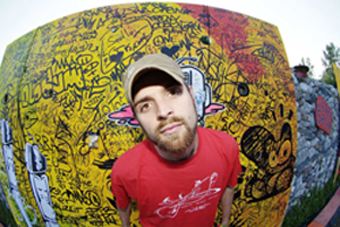26-year-old rap artist DJ Tubet engages in a linguistic search that knows no bounds, mixing his mother-tongue Friulian with Jamaican patois

Few imagine that behind a nickname redolent of the New York suburbs, lies the blameless Mauro Tubetti. Certainly, this local rapper is most definitely neither dissolute nor a daredevil. He has nothing of the cursed about him, unlike his American opposite numbers. Indeed he studies and experiments continuously. He dreams of being a teacher in the morning and a singer in the afternoon. Born in 1982, Dj Tubet mixes books, teaching and reggae rhythms, with the same ease that, on stage, leads him to weave rhymes, hip hop and patois (a variant of Jamaican English) with Friulian. A chameleon-like freestyler, when he hasn’t got a microphone in hand he hangs out on the farm family in Nimis, north of Udine. It takes music to drag him out of the house. It is – he assures me – always the music that broadens his many horizons.
Q Dj Tubet, do you support the creation of a crossborder Euroregion?
A I think it’s a good thing. Even though the region represents a boundary from a formal and historical point of view, it cannot represent a limit from a cultural perspective, precisely because of a need that is inherent in people. Therefore a crossborder body, linking us with other regions close by is a dimension we need: we need something more fluid, going beyond the concept of the region alone. In this, Friuli starts with an advantage in having so many microcultures. It’s a melting pot with many participants. It’s historically based on an exchange.
Q What role does music have in all of this?
A The music already has in itself a Euroregional character. Think about when I do gigs. Singing in Jamaican English, Friulian and Italian. Take, reggae for example, which is riven by the cultural influences of the place, just so that it can be conveyed better, responding to the area in which it’s performed. It’s the most transboundary music genre of the lot. As regards current musical projects, I often have dealings with Slovenia, for concerts and other stuff – the country is a forerunner in alternative music and the top punk artists stop off in Udine only because they are performing in Ljubljana.
Q Why do you base your musical research on the Friulian language?
A Italian is my second language. I didn’t learn it until I went to nursery school. In terms of identity, Friulano was my first cultural expression. I am proud of this. It’s given me a greater open-mindedness, towards diversity elsewhere and recent studies show how being bilingual is a positive addition from a cognitive point of view.
Q You have a degree in social psychology, one in educational science and you’re completing a third one in training science.
A I studied farming at high school. When I discovered Jung it brought me to psychology, but in my mind I wanted to be a teacher. So then I dedicated myself to studying education. I would like to teach in a primary or a high school.
Q You also sing?
A I’m working on the first album by ‘R.Esistence in dub’, in which I experiment with dub in Friulano. Reggae is a very radical musical genre but so far locally spoken dialects have only been experimented with in southern Italy. Now the new ‘Dlh posse’ album is due out. It’s a live swing double CD with the ‘Suingando quartet’. I’m also working on an a cappella project.
Q How do you manage to do everything? Where do you find the time?
A I can get by with little sleep and lead a very quiet life. I’m a vegetarian and I try to stay really thin. For the rest it, I rationalise my time. I go out only to perform and I live in this dimension. x